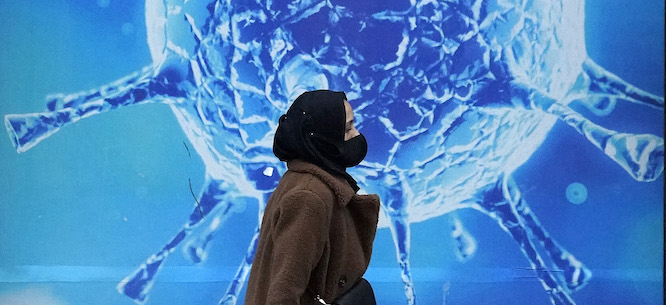Jacqueline Rose’s Wild Analysis
Jacqueline Rose’s Wild Analysis
Our ugliest psychological impulses can be a starting point for social criticism.

The Plague: Living Death in Our Times
by Jacqueline Rose
Farrar, Straus and Giroux, 2023, 176 pp.
In March 2020, the writer and academic Jacqueline Rose was putting the finishing touches on her book On Violence and On Violence Against Women when the avenues of the world’s capitals grew quiet. Wild animals began to stalk urban streets. Wails of sirens echoed off skyscraper façades, providing a faint index of the chaos within hospital walls. Medical gear was rationed; supply chains stuttered to a halt. Barred from seeing their dying loved ones in person, families said goodbye over shaky video screens thrust forward by underpaid and overworked nurses. Rage at the murder of George Floyd by police on May 25, 2020, propelled people out of quarantine and back into assembly. The rebellion spread worldwide but was contained by the forces of both reaction and reform.
Rose could hardly have expected to see the themes of her writing so abruptly tear open the world’s fabric. A professor of the humanities at the University of London’s Birkbeck Institute, she has spent decades honing her feminist psychoanalytic and social critiques on topics as varied as Zionism, Palestinian resistance, motherhood, and the cultural legacies of Sylvia Plath and Marilyn Monroe. Throughout the wide-ranging essays of On Violence, Rose argued that psychoanalysis offers a language for articulating the mind’s contradictory desires and impulses, particularly when encountering other people whose wills we cannot master. If we don’t acknowledge these desires, including those that exist in the sometimes frightening recesses of our own minds, they may burst out in other ways. In a repressive and unequal society, in particular, sexual and gendered violence become a means of “bringing sexuality to heel,” whether through repressive laws or physical domination. Rose’s theories found corroboration during the pandemic, which, she writes, made it “clear that you cannot force the world to your will.”
Her new book, The Plague, written on the heels of On Violence and published this June, enlists many of the earlier book’s central claims. Here, too, Rose’s analysis of sexual violence—including its perpetrators’ own fears and anxieties—offers a framework for grasping the simultaneous megalomania and vulnerability displayed by leaders like Trump, Bolsonaro, Modi, and Erdoğan as they sought to conquer a situation for which a fascist rulebook offered little guidance. The Plague examines the period from the initial pandemic lockdowns in early 2020 to Russia’s invasion of Ukraine in February 2022. Versions of these essays have been published before, in venues such as the Guardian, the New York Rev... Subscribe now to read the full article
Online Only
Print + Online
Already a subscriber? Log in:





